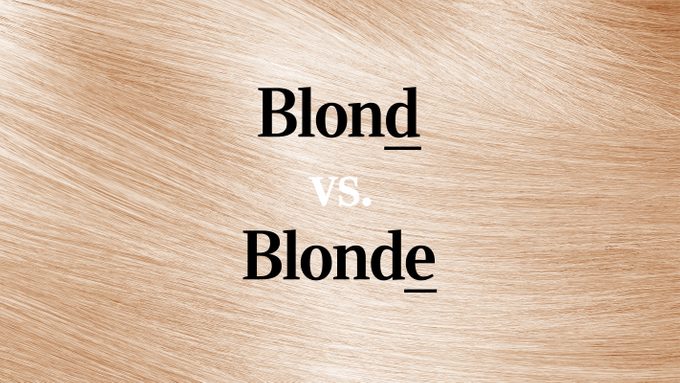You can tell a good blond joke, but can you tell the difference between blond and blonde? We’re here to help.

“Blond” vs. “Blonde”: Which Is Correct?

Blond vs. blonde is a debate that divides grammarians and leaves most of us scratching our heads. The words seem interchangeable—until you stop to think about it.
Why are there two spellings? And is it just about hair color, or does something deeper separate the two? Like many commonly confused words in English, the answer lies in both grammar and history.
These near-identical words come from French, and their gendered origins are what give them their distinct roles in English today. If you’ve ever felt piqued by a spelling choice in a novel or paused before typing a hair color into a caption, this is the breakdown you need. Read on for the details.
Get Reader’s Digest’s Read Up newsletter for more grammar, humor, tech and fun facts all week long.
What does blond mean?
Traditionally, blond (without the e) is used as an adjective or noun when referring to males. For example, in older novels or formal writing, a man with light-colored hair might be described as a “blond man.”
In American English, however, blond is also used more broadly as a gender-neutral descriptor, particularly as an adjective.
Examples of blond in a sentence
- The blond boy waited quietly by the door.
- He had thick, wavy blond hair.
What does blonde mean?
Blonde (with an e) is typically used for women. The e marks the feminine form, reflecting the original French grammatical distinction. In British English, this differentiation is still common: “a blonde woman” versus “a blond man.” In American English, the feminine form is most often used only as a noun—as in, “She is a blonde.”
Examples of blonde in a sentence
- The blonde sat by the window, watching the night sky.
- My date? The pretty blonde talking to my sister.
Where do these spellings come from?
The words blond and blonde trace back to the Old French blund, which meant “a light yellow color.” Over time, French preserved the gendered endings: masculine nouns and adjectives typically end without an e, while feminine forms include one. When English adopted the word, it brought along the gender distinction—though its usage has evolved, especially in the U.S.
Nowadays, the difference between blond and blonde is more stylistic than grammatical. In some contexts, either word could be acceptable, depending on the tone/style of the writing.
Is there a right way to use them?
If you’re aiming for precision:
- Use blond as the adjective for both genders in American English (“blond hair”).
- Use blond as the noun for males (“a blond”) and blonde for females (“a blonde”).
- In British English, keep the distinction more formal: blond for males, blonde for females in both noun and adjective form.
Modern usage, however, favors blond as a neutral term, especially in journalism and general writing, to avoid unnecessary gendering.
Blond vs. blonde: How to remember the difference
Let the e in blonde guide you—female also has an e. So if you’re describing a woman, using the word as a noun, go with blonde. If you’re referring to a man or using the word more generally as an adjective, blond is the safer bet.
In casual writing, however, you won’t be wrong choosing one consistent spelling throughout, especially in American usage.
Why trust us
At Reader’s Digest, we’re committed to producing high-quality content by writers with expertise and experience in their field in consultation with relevant, qualified experts. We rely on reputable primary sources, including government and professional organizations and academic institutions as well as our writers’ personal experiences where appropriate. We verify all facts and data, back them with credible sourcing and revisit them over time to ensure they remain accurate and up to date. Read more about our team, our contributors and our editorial policies.
Sources:
- Merriam-Webster: “Blond”
- Oxford English Dictionary: “Blond”
- Merriam-Webster: “Blonde”
- Oxford English Dictionary: “Blonde”
- Grammar Girl: “Blond vs. Blonde”
- American Heritage Dictionary: “Blond, Blonde”
- Chicago Manual of Style: “Gendered Nouns”





















